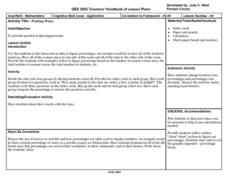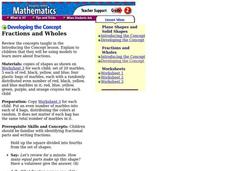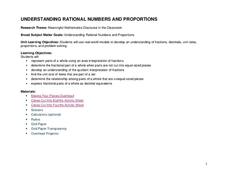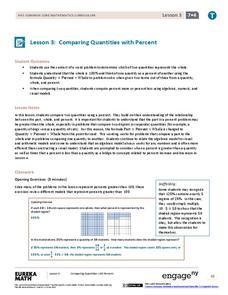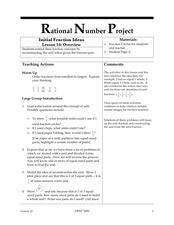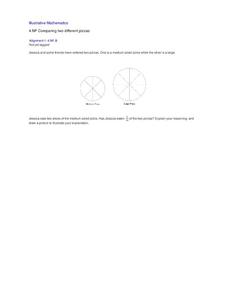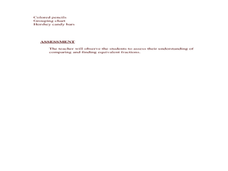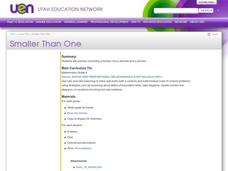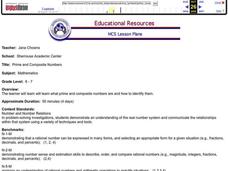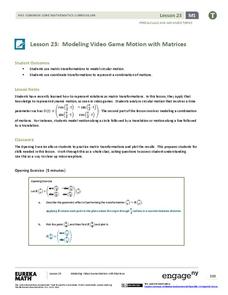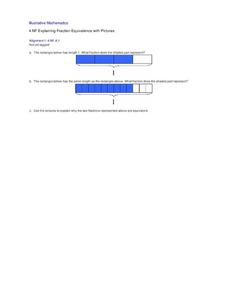Curated OER
Parting Ways
Students become part of the solution as they practice figuring percents. The number of men versus women present in the room and their heights can be used to form the basis of this investigation.
Curated OER
The Divider (whole number remainders)
Third graders use the lesson to support division of whole numbers where there is either no remainder or whole number remainders. They are able to
slit division problems into parts using known multiplication and division facts.
Curated OER
The Part-Adder 2
Third graders use mental-math strategies to solve two-digit plus two-digit addition problems. They observe and discuss online demonstrations, solve word problems as a class, and independently solve problems and describe their solutions...
Curated OER
Fractions and Wholes
Second graders explore fractions with a worksheet and marbles. In this fraction lesson, 2nd graders recognize the fractional parts of a shape pictured and find equal fractions.
Curated OER
Shel Silverstein Poetry Math
Fifth graders explore the connection between poetry and math by reading poems that involve numbers. In this Shel Silverstein poetry math lesson, 5th graders listen to 5 poems read aloud and discuss how math was used in the...
Illustrative Mathematics
Factors and Common Factors
This is an exercise in finding the greatest common factor of two whole numbers. Use in direct instruction or as part of your guided practice. Make up additional problems for home work. It also can be used as a mini-assessment or test...
Curated OER
Decimals in the Dugout
Young scholars investigate place value and decimals during baseball related activities. In this place value lesson, students explore place value with decimals. Resources are included.
Curated OER
Understanding Rational Numbers and Proportions
Learners explore parts of a whole. In this fraction lesson, students determine what makes a fair share. Working with manipulatives, learners solve mathematical problems containing fractions.
Curated OER
To Be (Half) Or Not To Be (Half)
First graders demonstrate various ways to represent and verify a whole or set separated in two, three, or four equal parts. Using interlocking cubes, Students model a part of a whole or a part of a set. They use appropriate tools and...
EngageNY
Comparing Quantities with Percent
Be 100 percent confident who has the most and by how much. Pupils use percentages to help make the comparisons by finding what percent one quantity is of the other. They also determine the percent differences between the two...
Alabama Learning Exchange
Understanding Fractions
Young learners explore fractions and demonstrate parts of a whole by using a candy bar and a piece of paper and dividing both into equal parts. Included is a worksheet that requires youngsters to color in half of each polygon shape. Some...
Curated OER
Equivalent Fraction Paper Strips
Young learners compare the relative values of fractions by making physical representations. They fold and label strips of paper that are equal in length to represent "one whole" and the equal parts that fractions represent. Also, they...
Curated OER
Initial Fraction Ideas Lesson 16: Overview
Kids will compare creating fractions from pieces of paper to chips. They begin with a fractional part and work back to a whole. Then order fractions from smallest to largest. They also complete a worksheet to find the missing pieces to...
Illustrative Mathematics
Comparing Two Different Pizzas
What better way to learn about fractions than with a couple pizzas? Help Jessica figure out how much of the pizza she has eaten, while teaching your class that fractions refer to a specific whole amount. This problem will be challenging...
Curated OER
Hershey Bar Equivalent Fractions
Fourth and fifth graders explain how to use equivalent fractions. They recognize which fractions are equivalent. Pupils find equivalent fractions.
Curated OER
Smaller Than One
Students examine how to convert fractions into decimals and percents. They work with base ten blocks and a worksheet to color in parts of 100 and renaming the parts as decimals and fractions.
Illustrative Mathematics
Sugar in Six Cans of Soda
Understanding how to multiply a whole number by a fraction is the key concept. Young mathematicians create a visual model of this real-world example and find the solution. Extensions are possible for making this an even richer activity....
Curated OER
Prime and Composite Numbers
Prime and composite numbers are the focus of this mathematics instructional activity. In it, learners practice techniques for identifying these two types of numbers. They utilize the Inspiration program to complete a task that is clearly...
Mathematics TEKS Toolkit
Am I Related to Myself?
Elementary or middle schoolers use ratios to discover some nearly constant relationships between measurements of parts of the human body. They find and record pairs of measurements and determine the relationship between the pairs. Pupils...
EngageNY
Modeling Video Game Motion with Matrices 2
The second day of a two-part lesson on motion introduces the class to circular motion. Pupils learn how to incorporate a time parameter into the rotational matrix transformations they already know. The 24th installment in the 32-part...
Illustrative Mathematics
Representing Half of a Circle
Geometric shapes make great visual models for introducing young mathematicians to the concept of fractions. Looking at a series of four circles, learners are asked to determine whether or not one half of each circle is shaded. To support...
EngageNY
Recursive Challenge Problem—The Double and Add 5 Game
Math is all fun and games! Use a game strategy to introduce the concept of sequences and their recursive formulas. The activity emphasizes notation and vocabulary.
Curated OER
Decreasing and Increasing Fractions
Use this math instructional activity to help your fourth graders further their understanding of ordering fractions. After completing some whole-group activities together as a class, pairs of students play an online game which has them...
Illustrative Mathematics
Explaining Fraction Equivalence with Picture
Visual models are a great tool for demonstrating the concept of equivalent fractions. Given two pictures, young mathematicians first identify each fraction and then write an explanation for why they are equivalent. Use as a guided...
